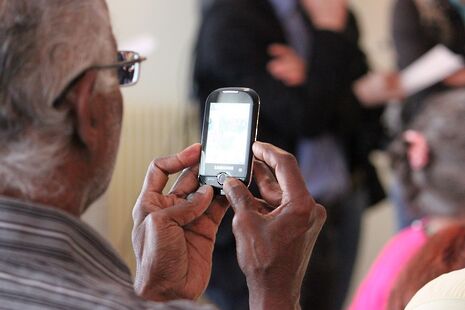A generational thing?
We all know that different generations have different attitudes to technology, says Finley Kidd, but who’s right?

My grandpa is not a fan of mobile phones. When I say not a fan, I’m not talking about mere ambivalence. Rather, he’s the type of person to suggest that for a birthday treat, the whole family should completely abandon whatever screen-based vices they might be harbouring for the day and actually (gasp) spend time together.
This distaste for phone usage has led me to become a master of the surreptitious scroll, my phone cloistered in a blanket while I peruse Instagram and check out what’s happening on the group chat, all while avoiding the ire of my elders. The wifi password at my grandparents’ house is a secret murmured between cousins and the occasional Facebook loving uncle, and there is no mobile signal to speak of.
The thing is, when I’m at theirs, I would much rather be playing Articulate with my grandma or hanging out with my younger cousins than watching people I only distantly know live tweeting themselves eating their cornflakes. It’s just in the quiet moments that I notice how much I gravitate towards my phone, and how odd it is that for the generation that grew up without social media, this pull is simply absent. My peers and I find ourselves in the strange and unique position of growing up in synchronicity with the proliferation of social media.
It feels odd to think about the way in which as I grew older, social media grew too. I went from spending my nights using MSN on the family computer as an 11 year old to witnessing the popularisation of Snapchat when I was about 15. I travelled from Facebook to Twitter, Tumblr to Instagram, dial-up internet to wifi. Yet social media has unequivocally been a part of my life for my entire adolescence, only becoming increasingly streamlined and interwoven into the fabric of everyday reality.
"Does the internet just make us close off from the tangible world, replacing meaningful connection with memeful isolation?
It isn’t an overstatement to say that I literally cannot imagine my life without it. So many of my key moments, conversations and connections happened via social media and the internet, not to mention its power in exploring and fashioning self-identity. I find myself in a position now where going without a phone or the internet for several days would leave me feeling at a huge loss for connectivity.
What strikes me as particularly strange about this is that for someone even 30 years older than me, this just isn’t the case. Lots of older people are becoming more fluent in the language of social media, and the middle-aged in particular seem to be on Facebook in swarms. Still, the other day I had to explain to my mum what a ‘feed’ was, which really brought home the way that she still lives her life unencumbered by the series of ever refreshing boards of text and image that I check multiple times a day, every day.
I wonder whether older generations’ complaints about social media making us more antisocial and less engaged stem from a place of superior insight, or just from lack of understanding and the immersion in social media that we’re accustomed to. Perhaps one day we’ll be frowning at babies taking selfies at their own christenings and spouting the usual “Not In My Day” admonishments, much to everyone’s annoyance. Or, maybe the seeming vastness of this generational gap is particular to this age, where technology was not a pervasive part of life until, quite suddenly, it was.
Is my grandpa, and many others like him, right? Does the internet just make us close off from the tangible world, replacing meaningful connection with memeful isolation? I’m sure that in many ways it does. Google Maps means I never ask strangers for directions, I order things online instead of going shopping, and it’s all too easy to just text your friends rather than actually speaking to them face to face.
However, I think it would be nearly impossible to argue that social media doesn’t make us more connected in other ways. It stops us losing touch with people we love when being physically together isn’t possible, and means I get to see snapshots of my friends’ days so that they always feel present. Social media makes organising real life collectivity and collaboration easier, and brings together those that are marginalised and isolated in their geographical communities.
In truth, I don’t know whether I’d be better off without the internet because I can’t begin to imagine what my life would look like if that were the case. I’m grateful to my grandparents for encouraging me to put down my phone and just be with my family, but I don’t think I would want to relinquish social media permanently. I will never have the experience of growing up without social media that older generations had, and they will never have mine. Therefore, it seems meaningless to debate which is preferable when we are each only speaking from the singular perspective of our experiences. I think I’ll just get on with tagging my friends in memes to express my undying love and affection
 Interviews / You don’t need to peak at Cambridge, says Robin Harding31 December 2025
Interviews / You don’t need to peak at Cambridge, says Robin Harding31 December 2025 News / Unions protest handling of redundancies at Epidemiology Unit30 December 2025
News / Unions protest handling of redundancies at Epidemiology Unit30 December 2025 Comment / What happened to men at Cambridge?31 December 2025
Comment / What happened to men at Cambridge?31 December 2025 Features / ‘Treated like we’re incompetent’: ents officers on college micromanagement30 December 2025
Features / ‘Treated like we’re incompetent’: ents officers on college micromanagement30 December 2025 Theatre / We should be filming ADC productions31 December 2025
Theatre / We should be filming ADC productions31 December 2025








